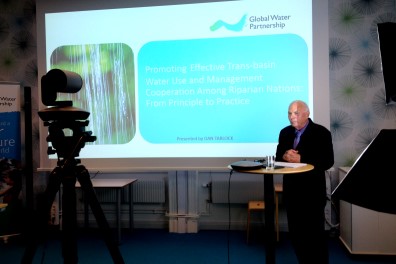When: August 28, 2015 at 13:30-15:30 CEST
What: Launch of three new Technical Focus Papers
Where: A link to the recorded live stream is available here.
Speakers at the launch was Prof. Shen Dajun of Renmin University (GWP China), Jozsef Gayer (GWP Central and Eastern Europe) and Prof. Moses Tenywa from Makerere University (GWP Eastern Africa). They introduced the following Technical Focus Papers:
China's Water Resources Management Challenge: The three red lines
Throughout China’s history water has always been an essential part of political and economic life and important to the country’s prosperity and stability. Today, China is facing a great challenge as water resources begin to constrain the nation’s economic and social development. This paper describes the key water challenges facing China and the steps being taken to introduce new, stringent boundaries, the so-called "three red lines" which set limits on water use, efficiency, and pollution. This paper is available online.
Integrated water resources management in Eastern Africa: Coping with ‘complex’ hydrology
Extreme and unpredictable rainfall patterns, intense floods, and droughts add significantly to the cost of controlling and managing water resources in Eastern Africa. This paper describes the approaches being taken in selected countries and how each country has interpreted the IWRM principles to address water resource management challenges. IWRM, introduced almost 20 years ago in Eastern Africa, is still a ‘work in progress’. The main challenges involve a need to build professional, technical, and institutional capacity. This paper is available online.
Integrated water resources management in Central and Eastern Europe: IWRM versus EU Water Framework Directive
The countries of Central and Eastern Europe faced the challenge of becoming EU Member States. In the water sector, the environment and water quality requirements of the EU Water Framework Directive dominate water resources planning and management. Many see this as a surrogate for IWRM, though IWRM has a much broader focus on sustainable social and economic development, not just on the environment. This paper explores the relationship between the aims of the EU WFD and IWRM principles. This paper is available online.
Background Paper
In addition to the launch of the Technical Focus Papers, a presentation of a Background Paper was made by Professor A. Dan Tarlock. The topic is on how to go from principle to practice in trans-basin water use and management cooperation among riparian nations.
The paper argues that we need more refined measures of cooperation and examples to provide nations with models to adapt to a specific basin. Cooperation of basin-shared nations for cooperation’s sake will not necessarily provide benefits. Benefits must be measurable. Some benefits, such as shared hydropower revenues or a firm allocation, will be immediately measurable; others such as restoration of ecosystem services take more time to measure. Measurable cooperation benefits generally require a legal framework. This paper is available here.
Photo: Professor A. Dan Tarlock presenting the Background Paper.

